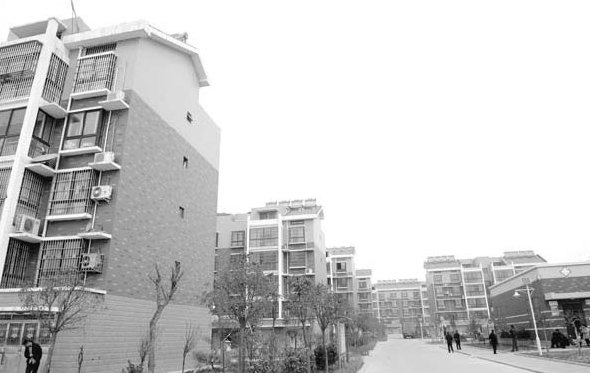The challenges of urbanization
Updated: 2013-06-25 15:35
(China Daily)
|
||||||||
|
Modern Zhengchangliu village in Zhengzhou, Henan province. China's urbanization program is expected to cost 40 trillion yuan ($6.53 trillion) over the next decade. Provided to China Daily |
Urbanization | Zheng Yangpeng
At the closing ceremony of an urbanization training program organized by the Chinese Academy of Governance, Liu Chuncheng, a trainee and vice-mayor of Chifeng, in the Inner Mongolia autonomous region, made a speech on behalf of his team.
"In the run-up to the presentation, we suffered an embarrassment. Our team's research topic was public service. Only six trainees chose to join the team. Public service is mostly related to urbanization. But the number suggested our officials had little interest in the topic," he said.
The audience, mainly made up of local officials, responded with understanding laughter and applause.
Indeed, among the four topics offered to the 38 officials from local governments, State-owned enterprises and ministries under the State Council, "public service" was the least favorite. Three other topics - investment and financing, land management and industry - met with more enthusiasm.
"Local governments think that providing public service should came after the development of the local economy. Public service should improve only after the economy is boosted," Liu said. "In terms of public service, there is also a tendency to rely on central government."
Another largely unspoken reason, according to an official sitting below the stage who declined to be identified, is the fact that ratcheting up public service is less likely to promote local officials' political performance. Investing in new zones, highways and bridges is more likely to be recognized.
The slower economic growth rate has pushed China to focus more on domestic demand. Much hope has been pinned on the urbanization program, which will reportedly cost 40 trillion yuan ($6.53 trillion) in investment in the next decade.
Premier Li Keqiang, one of the masterminds of urbanization, has reiterated the importance of pushing forward the strategy. Last May, he signed a communique with Jose Manuel Barroso, president of the European Commission, on an urbanization partnership. The Chinese Academy of Governance is part of the program. It is responsible for inviting European experts in this area to give lectures to Chinese officials. Last month, it invited architects and consultants from Italy and Germany to give a lecture to them.
But, ultimately, how the grand strategy is actually implemented is largely dependent on the idea of millions of local officials at the country's provincial, municipal, county and even township levels, who live in an environment very different from that of central government officials.
There are already many reports in the Chinese media about how local officials are preparing to ramp up infrastructure and property spending in the name of urbanization.
The training program organized by the Chinese Academy of Governance, a top school to train elite officials, offered us a rare chance to focus on the important topic.
China Daily's interviews with these officials provided a sense of reassurance against concerns local governments might spoil the strategy, at least from the tone of their rhetoric.
All trained officials agreed the new urbanization drive should emphasize public service as well as investment opportunities. It should aim to improve the quality of the urbanization process and steer away from reckless urban expansion, they said.
Xiao Wensun, vice-mayor of Liuzhou, an industrial city in southwest Guangxi Zhuang autonomous region, said new urbanization should focus on the settlement of migrant workers, industrial development and services matching the development of the urban area.
"We should regard urbanization in the macro system of four pillars," Xiao said, referring to urbanization, industrialization, informatization and agricultural modernization. "It is a handle to transform the economic model."
Many officials stressed the importance of developing industries to sustain urbanization, a drive that is expected to create abundant job opportunities for those emigrating to expanding cities.
But industries are not necessarily the only option to create jobs and local governments should refrain from attracting homogeneous manufacturers, said Zhou Shijie, vice-mayor of Xinxiang, a booming city in central China's Henan province.
He cited Xinxiang as an example. The government has divided its administration into four tiers: At the top is the central city and at the bottom are the new rural communities. Between are counties and townships. The central city, Xinxiang, highlights grouping development, with a core downtown area and five neighboring sub-towns, each with a designated pillar industry. The counties and townships focus on inner-oriented development, emphasizing redevelopment of the old towns. The new rural communities are designed to locate around the towns. It could save land and public utilities and offer equal public service to rural residents.
Instead of largely homogeneous manufacturing industries, cities should develop various businesses based on their specific advantages, such as tourism, commerce, logistics and specific forms of agriculture, said Zhou.
He is concerned about the current land usage system, which he said is outdated and designed in a way that has increasingly impeded urbanization. According to him, the land management regime is both "stringent" and "relaxed".
"The stringent aspect is that acquiring new land quotas involves many due procedures and takes an extremely long time, which fails to satisfy demand for rapid urbanization on a local level," Zhou said.
"The relaxed aspect is seen in a lack of differential management rules for land with different purposes of use. There is a low threshold for industrial land approval that fails to prohibit many backward industries."
Wang Jiming, vice-mayor of Ezhou, in central China's Hubei province, also stressed the importance of scientific planning and reasonable layout designs for urban areas.
"It is wrong to think the bigger the city's size, the better it is," he said. "Urban development should be modest and respect ecological sustainability."
He said many local governments prefer to build new urban areas while neglecting the maintenance of old towns. For example, the repair of damaged roads and street lamps, the upgrading of the sewerage system and the construction of parks and sports centers are often ignored.
"There is a tendency to stress construction while neglecting management. It is because construction easily demonstrates political achievement while day-to-day management does not," Wang said.
The officials said they are willing to provide more public services so they do not lag behind the physical buildup of the city. But in reality they face many obstacles. Local governments usually are not sufficiently well funded to accomplish the jobs they face and the fast turnover of migrants makes it difficult to offer appropriate services to them.
"The situation is that although the number of migrants is stable, the composition of this stable number is highly fluid," said Zhou. "We are making efforts to address their healthcare and educational demands but, in terms of housing, frankly speaking, we are not able to (tackle the problem)."
Officials who attended the class called for local government initiatives and specific policies catering to local needs.
When an official raised the issue of local initiatives, he was enthusiastically endorsed and the atmosphere turned fervent. "Local experiments should be encouraged. It does not matter that a mistake may be made. On the contrary, mistakes provide experience. What we fear is a little mistake being severely punished, making other people dare not to innovate anymore," an official said.
"China is so diverse, with huge differences within the country. How can one urbanization plan fit all?" asked Zhou.
Contact the writer at zhengyangpeng@chinadaily.com.cn
(China Daily USA 06/24/2013 page15)

 Philippine, US start Naval exercise in S China Sea
Philippine, US start Naval exercise in S China Sea
 Supreme Court gay rights ruling celebrated across US
Supreme Court gay rights ruling celebrated across US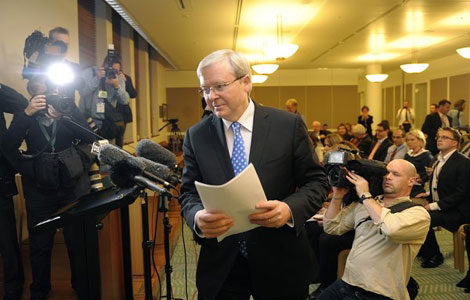
 Rudd returns as Australian PM after Gillard
Rudd returns as Australian PM after Gillard
 Brazil protests intensify before Confed Cup semifinal
Brazil protests intensify before Confed Cup semifinal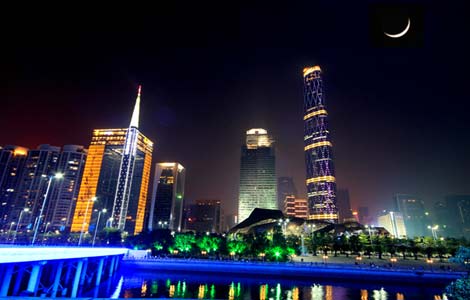
 Long lost weekend
Long lost weekend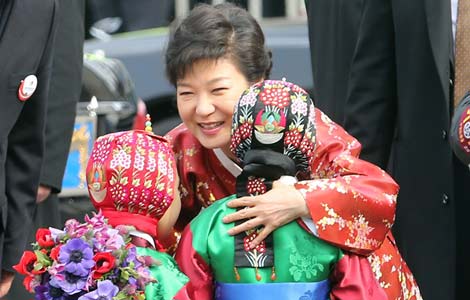
 Park ready to charm China
Park ready to charm China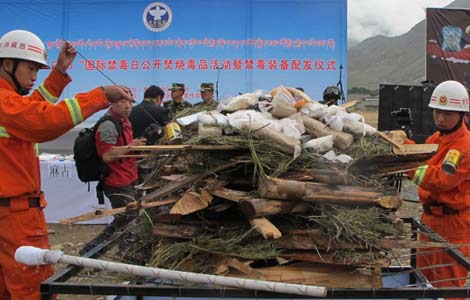
 Prices climb as police crack down
Prices climb as police crack down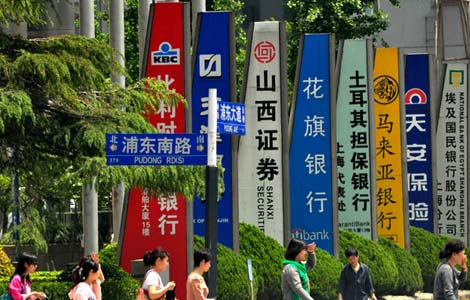
 China 'most promising' in FDI
China 'most promising' in FDI
Most Viewed
Editor's Picks

|

|

|

|

|

|
Today's Top News
Proposed law puts curbs on family visas
Markets will stay volatile, continue to struggle: Expert
Promising outlook on US, China investment
US adoptees visit Chinese roots
Ecuador refutes Washington Post accusation
IBM to make Chinese job cuts
PBOC ends credit crunch, to go further
Snowden still at Moscow's airport, asylum pending
US Weekly

|

|
